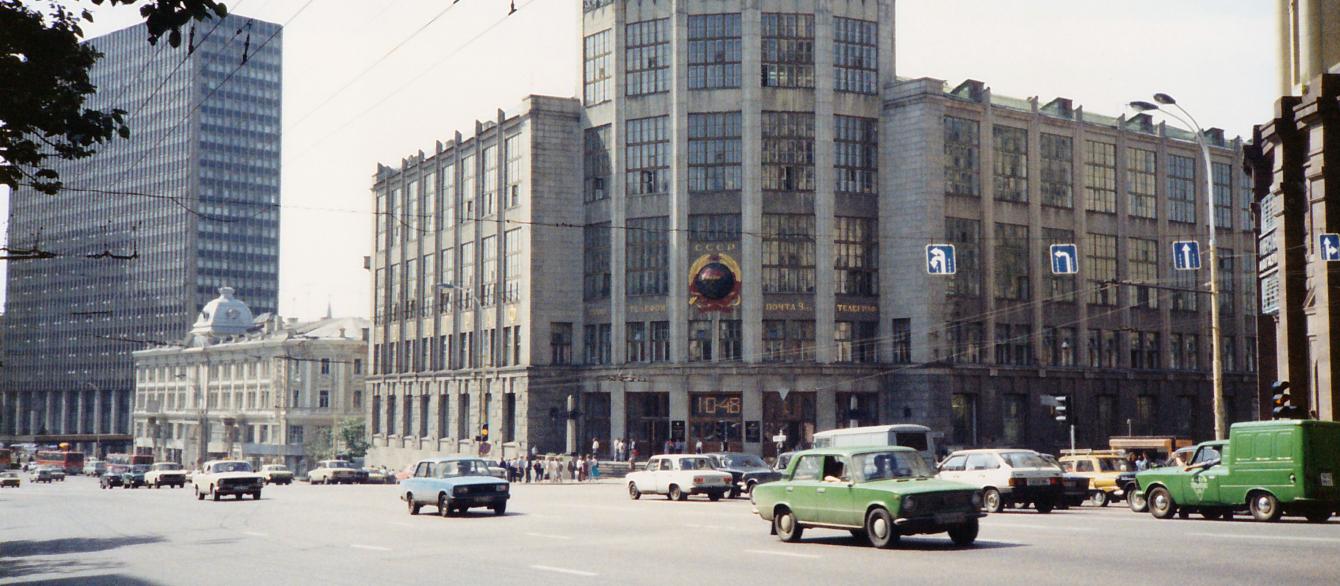The study of the late Soviet Union has increasingly been the subject of nuanced scholarship. As opposed to previously existing studies—which often focused on the era’s stagnation, decline, and disappointment—newer work has emphasized what might be considered the “positive” or “productive” sides of the late Soviet Union. In this new approach scholars tend to explore subjective experiences rather than focusing on the somewhat one-dimensional failures of the era. This conference aims to further complicate conventionally held ideas about the late Soviet Union by looking at how exactly the post-Stalinist environment informed social practices and individual lives. Presentations are from graduate students (PhD, MA) working on topics related to the history of the late Soviet Union (1953-1991). Panels center on environment, gender, nationalities, and morality / spirituality. This event will be held in a Zoom seminar format.
Agenda
Welcome and Introductions | 9:00-9:15 AM
Anna Ivanova and Danielle Leavitt-Quist
Panel I: Late Soviet Environment | 9:15 - 10:30 AM
Nicholas Seay, Ohio State University, "Without Toil There is No Treasure: Environment and Cotton Labor in Soviet Tajikistan"
Abigail Bratcher, University of Chicago, "The Development of Central Asian Pedology in the Aftermath of the Virgin Lands Campaign"
Alexandra Noi, University of California, Santa Barbara, "The Ex-prisoners of Gulag in the Siberian Expeditions"
Chair: Danielle Leavitt-Quist, Harvard University
Discussant: Johanna Conterio, Flinders University of South Australia
Break | 10:30-10:45 AM
Panel II: Late Soviet Nationalities | 10:45 AM-12:20 PM
Faruh Kuziev, Central European University, "Muslim scientists, Muslim soldiers, and Muslim Muslims: Microhistory of Sharora (the 1950s-1990s)"
Anna Kozlova, Carleton University, "Foreigners in their own homeland: The lives of Russian-Germans in the Soviet Union"
Hilary Lynd, UC Berkeley, "Mankurts and Natives: Ethnicity as Authenticity in the Long 1970"
Lizaveta Lysenka, Higher School of Economics, Moscow, "Belarusianness in the songs and visuals of the Soviet VIA "Pesniary""
Chair: Anna Ivanova, Harvard University
Discussant: Erin Hutchinson, University of Colorado Boulder
Lunch Break | 12:20-12:50 PM
Panel III: Late Soviet Gender | 12:50-2:25 PM
Kateryna Ruban, NYU, "Between "Rulers" and "Ruled": The Authority and Autonomy of a Soviet Doctor in a Provincial Hospital in the 1950s"
Ekaterina Voronova, Russian Academy of Sciences, "Perception and Self-representation of Soviet Fatherhood in the Male Letters to Authorities (1950-1960s)"
Anna Sidorevich, Centre d’histoire Sciences Po Paris, "Leningrad Samizdat Women’s Magazines (1979-1982): Between Soviet Emancipation and 'Second-wave' Feminism"
Emily Lobenstein, University of Wisconsin - Madison, ""Everything is Allowed That is Not Forbidden": Envisioning a Communist Future through the 1988 Miss Moscow Pageant"
Chair: Danielle Leavitt-Quist, Harvard University
Discussant: Alissa Klots, University of Pittsburgh
Break | 2:25-2:40 PM
Panel IV: Late Soviet Morality, Creativity, and Spirituality| 2:40-3:55 PM
Christopher Leger, Texas Tech University, "Public Morality and Labor Prestige in Khrushchev Era Newspapers"
John Kennedy, European University Institute, "The Soviet self-making auto-constructors’ movement: from Thaw to Stagnation"
Elena Romashko, Georg-August-Universität Göttingen, "Martyrs, Wormwood and Nuclear Wasteland: Analyzing Late Soviet Union using Russian Orthodox Icons of Chernobyl and Religious Monumental Artworks"
Chair: Anna Ivanova, Harvard University
Discussant: Joseph Kellner, University of Georgia
Closing Remarks | 3:55-4:00 PM
Accessibility
The Davis Center for Russian and Eurasian Studies at Harvard University encourages persons with disabilities to participate in its programs and activities. If you anticipate needing any type of accommodation or have questions about the physical access provided, please contact us at 617-495-4037 or daviscenter@fas.harvard.edu in advance of your participation or visit. Requests for Sign Language interpreters and/or CART providers should be made at least two weeks in advance if possible. Please note that the Davis Center will make every effort to secure services but that services are subject to availability.




